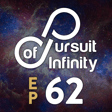
33. Mind, Karma, and Cosmos in Buddhism with Roger Jackson
In this week’s episode, we welcome Roger Jackson to the show. Roger is a Professor of Asian Studies and Religion at Carleton College. He has nearly 50 years of experience with the study and practice of Buddhism, particularly in the Tibetan Buddhist tradition. His areas of interest include Indian and Tibetan Buddhist philosophy, meditation, and ritual; Buddhist religious poetry; and modern Buddhist thought. Along with receiving his PhD from the University of Wisconsin, Roger has trained under some of the great Tibetan Buddhist masters. He has written a ton of books on the subject, but today we’re going to talk about his new book titled Rebirth: A Guide to Mind, Karma, and Cosmos in the Buddhist World. The book mainly takes on the task explaining Reincarnation, or as Roger refers to it, Rebirth, within different Buddhist sects and cosmologies.
Buy Rebirth: A Guide to Mind, Karma, and Cosmos in the Buddhist World:
https://www.shambhala.com/rebirth.html
_________________
Music By Nathan Willis RIP
Follow Pursuit Of Infinity:
www.PursuitOfInfinity.com
Discord: https://discord.io/pursuitofinfinity
YouTube: https://www.youtube.com/channel/UCPpwtLPMH5bjBTPMHSlYnwQ
Spotify: https://open.spotify.com/show/58he621hhQ7RkajcmFNffb
Apple Podcasts: https://podcasts.apple.com/ca/podcast/pursuit-of-infinity/id1605998093
Instagram: https://www.instagram.com/pursuitofinfinitypod/
Patreon: Patreon.com/PursuitOfInfinity



















